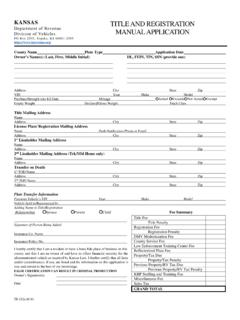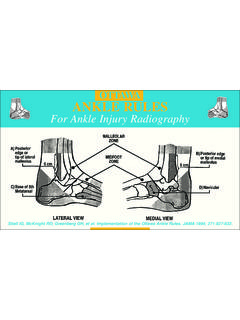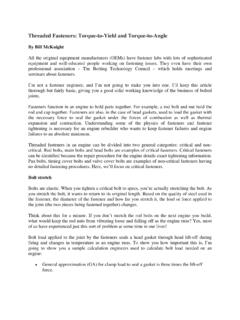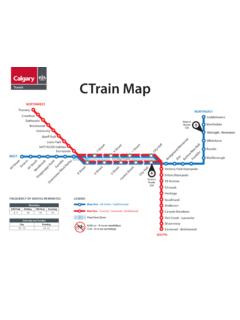Transcription of Command Philosophy - COL Danny R. McKnight
1 Command Philosophy COL Danny R. McKnight , USA (Ret.) 1. The most important and sacred responsibility entrusted to an officer or noncommissioned officer is the privilege of leading American soldiers. Leading soldiers and being charged with the responsibility of their professional development, and possibly their lives, is an awesome trust. Your subordinates must understand what is important to you because, ultimately, this will become important to them. No organization can progress without this framework and, more importantly, it must be understood and practiced by all leaders within the organization.
2 The Command Philosophy is this framework a framework which will guide how I operate in all environments, in the field or in garrison. 2. For any Command Philosophy to work, it must be lived daily. It must stand on its own merits, easily understood by all. It must be the basic leadership standards which guide the organization. The commander must always keep in mind the importance of establishing high yet realistic standards which are met. High standards lead to professionalism, and professionalism should always be the hallmark of this Battalion.
3 3. I will focus my thoughts on the traditional four glass balls of leading, training, maintaining, and caring. LEADING The old axiom, lead by example , will always serve you well. Soldiers and particularly leaders, are on parade 24 hours a day. We are constantly being scrutinized by others, especially our subordinates. We cannot enforce selective standards. By that I mean we cannot have one standard for the troops, another for the NCOs, and another for the officers. Basic soldier standards whether in the field or garrison, should apply to everyone.
4 We as leaders should always set the example we would like others to emulate. Effective two-way communication is essential to any organizations success. In order for us to consistently accomplish the mission, our subordinates must know what it is we expect of them. They must also be able to transmit to us any constraints they have that keep them from accomplishing what we ask of them. Without efficient, two-way communications, our efforts will be wasted. Treat your soldiers with the utmost respect and dignity; never humiliate them or publicly dress them down.
5 Soldiers, if treated properly, will normally not let you down. They will fail periodically, but never intentionally. They will always give the leader who respects them that extra effort, which so often makes the difference. Make your subordinates feel part of the team by keeping them informed and involved. Allow them to use their initiative. Capitalize on their unique skills and backgrounds. Leaders who identify with their troops and the unit will have a better appreciation for the strengths and weaknesses of the unit. Be genuine in your interest; soldiers can immediately detect when you are not sincere.
6 Be approachable, but never cross that thin line that separates you as leaders. Knowing the capabilities and limitations of the unit leads to mission accomplishment and lower casualty rates. Your soldiers will make mistakes; be prepared to underwrite these mistakes as professional development. Realize that an effective leader can help them to grow from a mistake and become a better unit after learning how not to do something. Accept responsibility for their mistakes; don t hang the fault on your subordinates. Stick up for your soldiers; they will repay you with loyalty and dedication.
7 Develop a sound counseling program. Do not reserve these sessions for only those who have faltered. Counseling sessions should be positive events bent on highlighting strengths and finding solutions to shortcomings. Remember, they will emulate those who they perceive to be successful (by virtue of your position you fall into that category); ensure they take away good habits and practices. Leaders must develop professional character. Some of this character can be acquired through the military school system. Whenever possible, allow your subordinates to attend these (keeping mind that the mission always comes first).
8 Realize it is normally extremely difficult for us as leaders to attend schools. Most professional character, however, is learned through experience and studying your profession. Unit professional development programs stressing map and terrain exercises, reviews of field manuals, studies on operations planning, and after-action reviews are excellent ways to ensure subordinate leaders possess the necessary experience and/or insights to accomplish the myriad of tasks we assign them. TRAINING We must take an innovative approach to our training while still concentrating on the basic soldiers skills and battle drills at all levels.
9 Never lose sight of the fact that our most important system is the soldier. Train him wisely use his brains, talents and dedication. Training is meticulously planned, innovative and challenging in its approach. Training is centrally planned and de-centrally executed to well-defined, enforced standards. Training should be oriented to accomplish mission essential tasks. High visibility training which has nothing to do with the unit s mission is a waste of time. I expect a detailed training plan with stated objectives and measurable standards.
10 All training will be performance-oriented and always have an evaluation plan. In developing training, ask WHO, WHAT, WHEN, WHERE, HOW AND WHAT RESOURCES are required and available. The training should be performance-oriented and progressive. It should be tough, challenging, multi-echelon combined-arms training designed to stress the soldier and promote individual initiative at the leader and troop levels. Concentrate on ensuring we can accomplish the mission. If training is truly progressive (and it should be), then time must be allotted to correct deficiencies.







